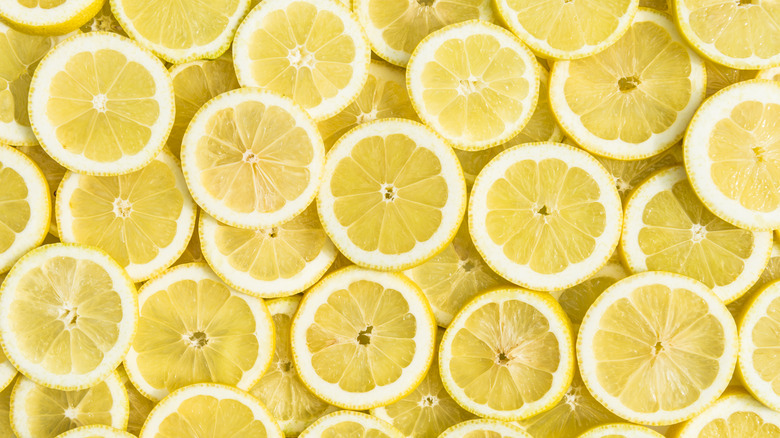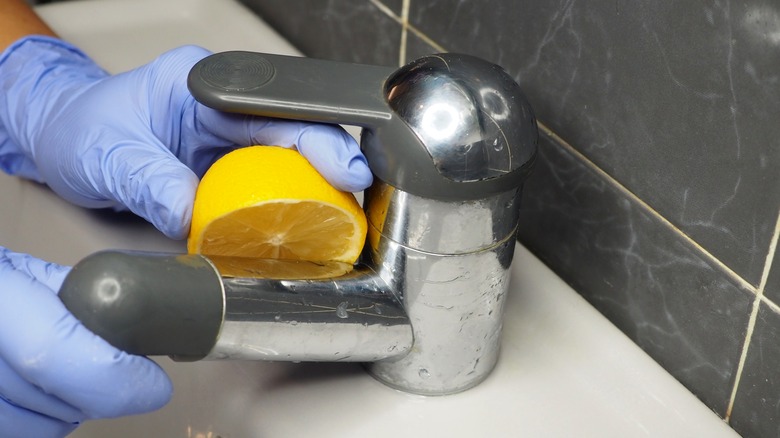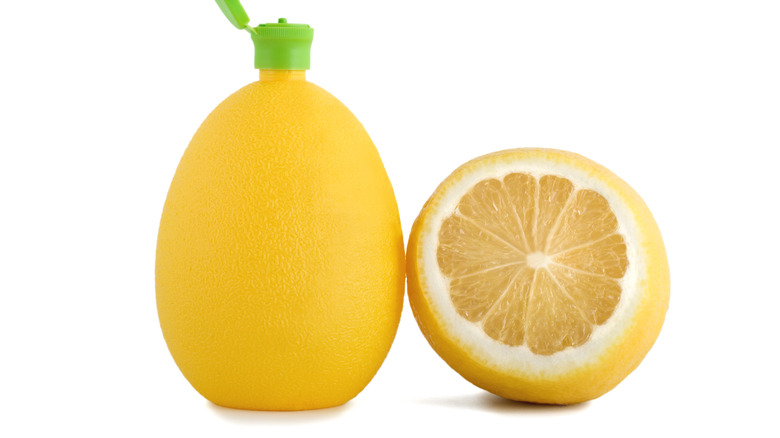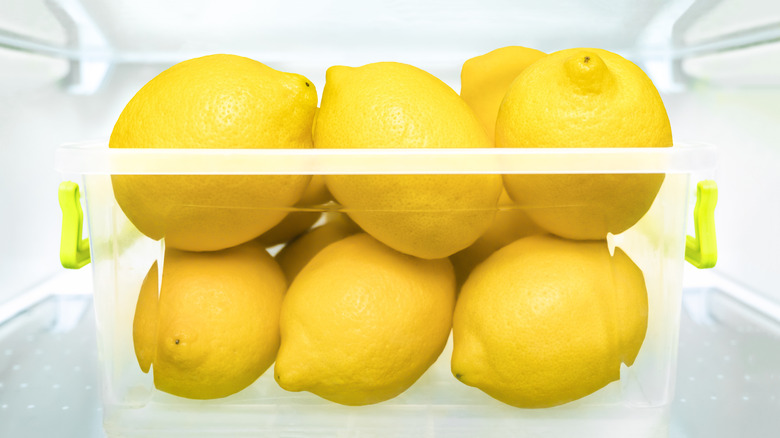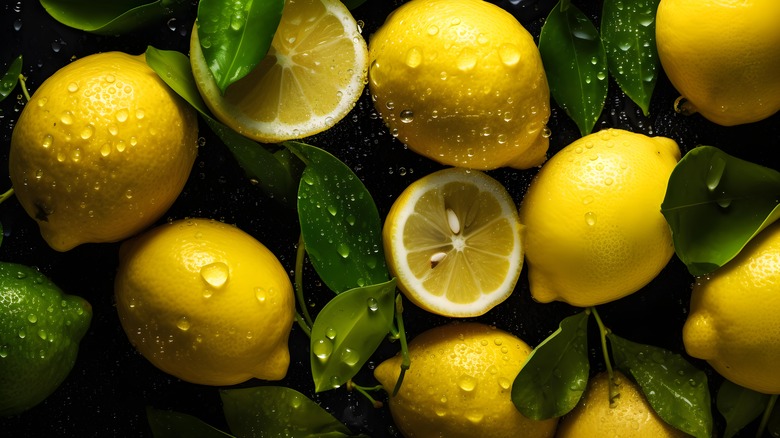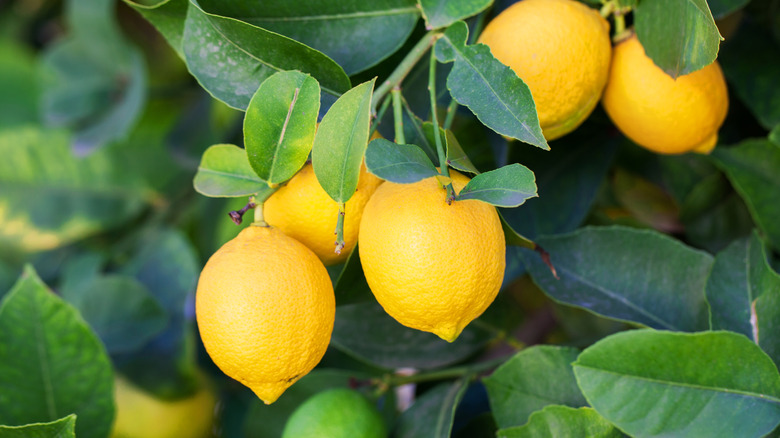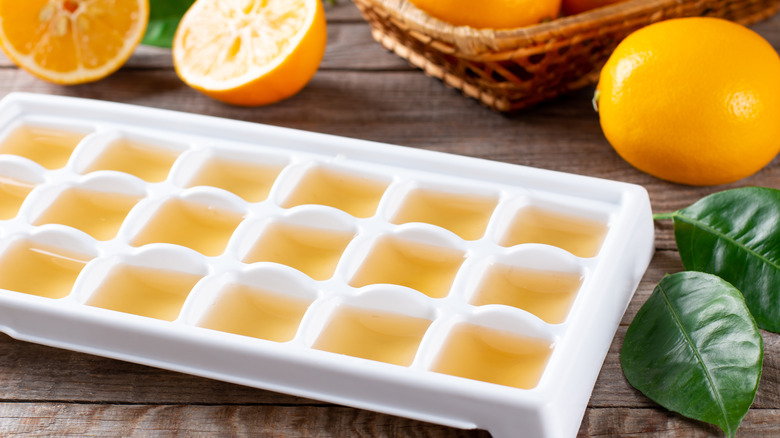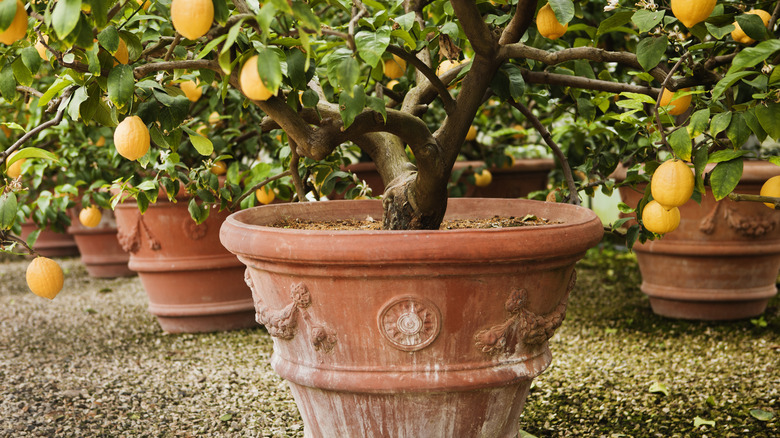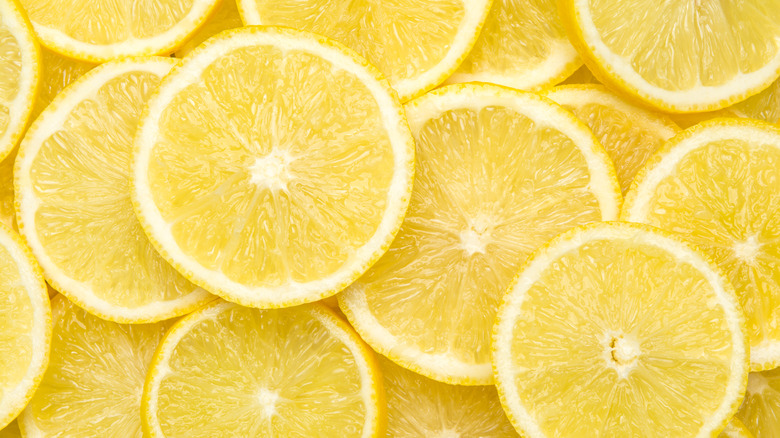False Facts About Lemons You Thought Were True
Lemons are a cherished ingredient in our kitchens, adding zing to dishes and drinks alike. From brightening soups and stews to enhancing the flavor of meats and fish to bringing citrusy goodness to sweet treats, they can do it all. But there are also many myths surrounding this sunny staple — and some of them are truly bizarre. Additionally, many of us forget that lemons have a variety of uses outside of our kitchens. And then there's the matter of growing lemons, which can seem either simple as pie or punishingly difficult, depending on who's talking.
Lemons are a fascinating fruit, and the truth should be known about them and their myriad uses. Should they be stored in or out of the fridge? Can they be frozen? Is it okay to use them to lighten your hair? We're here to answer all these questions — and more. By the end of this article, you'll know which "facts" about lemons are blatant falsehoods, and where the truth actually lies.
False: Their uses are limited to cooking and baking
We know that lemon juice and zest both make flavorful additions to a huge range of meals and desserts, enhancing sweet and savory dishes alike with their signature taste. But don't restrict your lemons to use in the kitchen only. These vibrant fruits can actually play a helpful role in many other aspects of our lives.
Firstly, lemons are one of those foods that are great to clean with: Their natural acidity is able to cut through grease and grime with ease. You can freshen up your garbage disposal by popping in half a lemon, pulsing it slightly, and letting it sit overnight. Or, try rubbing a lemon half over your kitchen sink and taps to remove limescale and make them shine. Lemons are also great for removing burnt-on food from pots and pans. Just add a little water, half a lemon, and boil. You'll find that the grime loosens with ease.
Lemon peels can also serve as a natural insect repellent. Those pesky critters find the citrus oil in the peels rather offensive, so they're likely to stay away if you add a few pieces of peel along your window sills or any other access points. It's a safe and natural way to keep your house pest-free. Additionally, lemons are effective natural deodorizers. If you've been prepping something particularly potent, like raw fish, rubbing a slice of lemon over your hands can help get rid of unwanted smells.
False: They can help you detox
Using lemon water as a detoxifying drink has gained popularity in recent years, with many wellness gurus claiming it's a cleansing powerhouse. But how much truth is there behind these claims?
Not much, as it turns out. Scientists argue that lemon water detoxes, which often involve consuming nothing but this sour beverage for multiple consecutive days, have no benefit on our bodies. When Healthline asked food scientist Joy Dubost about the lemon water trend, her response was clear: "There is not any scientific evidence that it provides health benefits," stated Dubost. "The side effects of going through this 5- to 7-day process would put me on edge." She went on to explain that the body is designed to rid itself of toxins and any other harmful substances naturally, through the gastrointestinal tract, liver, and kidneys. Plus, Dubost notes, consuming fiber is essential for this process to take place, which lemon water is void of. Drinking nothing but lemon water will also prevent your body for getting the other nutrients it needs to function.
So, yes, enjoying some lemon water can be a great way to hydrate. It works wonderfully as a refreshing drink or a warming tea, and can provide you with a good dose of vitamin C. But don't expect it to work any miracles when it comes to "detoxing."
False: Store-bought lemon juice is as flavorful as freshly squeezed
With pre-squeezed lemon juice readily available in stores, you might think that choosing it over actual lemons is a great, time-saving option. After all, is there really that much difference between the two?
Sadly, yes. Upon comparing store-bought and freshly-squeezed lemon juice, you'll actually notice some pretty stark differences. Freshly squeezed lemon juice has a vibrant, zesty flavor profile that just can't be matched by its store-bought counterpart. Store-bought lemon juice often contains added preservatives, which can mute the natural flavors of the fruit. The pasteurization process used to extend the shelf life of bottled lemon juice can also dull its flavor and nutritional value.
So if you're seeking the freshest and most flavorful lemon juice, there's no substitute for squeezing lemons by hand. If juicing a lemon is hard for you, a dedicated juicer or squeezer can be a great way to speed the process up — especially if you're short on time. Or, if you're worried about the shelf life of the lemons, try squeezing the juice into ice cube trays, freezing, and grabbing one whenever your dinner or drink needs a citrusy hit.
False: You should store them outside of the fridge
To refrigerate or not to refrigerate — it's a common dilemma when it comes to lemons. Many believe that storing them at room temperature is best for preserving flavor, but this won't keep them fresh for long. It might not seem like a natural choice, but refrigeration is actually the preferred method for storing lemons, as it helps slow down the fruit's ripening process and maintains its quality for a longer period of time. When left at room temperature, lemons are more susceptible to moisture loss and bacterial growth, which can make them inedible.
Popping your lemons in the fridge will extend their shelf life, keeping them fresh for up to one month. This is a pretty big difference to storing them at room temperature, where most lemons will only stay fresh for about a week. So if you've got a surplus of lemons on your kitchen counter, toss them in the fridge and you'll still be able to enjoy them later. Plus, keeping them chilled is ideal if you love to add a lemon slice or two to your cold drinks.
False: Lemons don't have many health benefits
Lemons are celebrated for their refreshing, punchy flavor and versatility, but don't underestimate their health benefits. These sunny citrus fruits are actually packed with goodness, providing us with a range of vital nutrients.
One of the most notable health benefits of lemons is their high vitamin C content. As a powerful antioxidant, vitamin C plays a crucial role in supporting our immune systems and protecting cells from damage. Just one lemon provides over half of the recommended daily intake of vitamin C. Additionally, lemons contain compounds called flavonoids, as well as limonene, which have been shown to possess antioxidant properties. These compounds may help to reduce the risk of developing certain diseases, such as cancer, diabetes, and osteoarthritis. Flavonoids have also been shown to have an anti-inflammatory effect on the body, and help to bring down high blood pressure. Lemons are also a great source of soluble fiber, but to reap the benefits of this, you'd have to eat the lemon flesh rather than just the juice or zest.
False: There are only a few different types of lemon
How many types of lemon can you name? If the answer is not very many, you're not alone. But there's actually a huge array of unique lemon varieties out there, each with their own unique flavor and appearance.
Two popular varieties are Eureka and Lisbon lemons, the most common types found in grocery stores. These are both pretty similar in appearance, with a distinctive oval shape and a sunny color, though Eureka lemons tend to have a slightly thicker skin. This makes them great for zesting. Beyond those classics, there are many other lesser-known varieties that offer distinct characteristics and flavors. For example, the Meyer lemon, which is smaller in size and features more orange-toned skin, has a sweeter, less acidic taste that's perfect for desserts and cocktails.
Some lemons are downright funky. Consider the rough lemon, which is known for its thick, bumpy skin and strong acidic taste, and the St. Teresa lemon, which has a distinct tangy flavor and floral notes. Some lemons even come in vivid colors, like the variegated pink lemon. This variety has green and yellow stripes, while the flesh inside is an inviting pink hue.
False: You can't freeze lemons
If you have a large stash of lemons that will take a while to get through, don't fret. Freezing them is absolutely an option. This simple and effective method is a great way to preserve their freshness and flavor for an extended period of time.
When it comes to prepping lemons for freezing, you have a few options. You can either freeze the lemon zest and juice separately, to get the hard work done in advance, or slice the fruit up in wedges or rounds before freezing. Ultimately, it depends on how you intend to use the lemons once you defrost them again. To freeze zest, you can split it into small portions and pop it in an ice cube tray with a couple of drops of lemon juice in each hole. This means you'll be able to grab just the right amount when you need it. Ice cube trays are also perfect for portioning up the juice. Try dropping a cube of lemon juice into soups and stews for extra zesty flavor.
For lemon rounds or wedges, place them in a food-safe container on top of a layer of baking parchment, pop a lid on, and freeze. They should keep well for about six months, and they're perfect for adding to cold drinks in the summertime. Unfortunately, freezing whole lemons is not recommended as they can become rather soft and soggy upon defrosting.
False: Drinking lemon water will make you lose weight
We've learned that lemon water isn't a detoxing aid, but can it help with weight loss? This is another idea that's become popular amongst wellness enthusiasts, but it's simply another myth. Lemon water can certainly be a refreshing and hydrating beverage, but its ability to promote weight loss is not supported by scientific evidence. This citrusy drink is indeed low in calories, and low in sugar when compared to conventional sodas, but adding lemon water to your diet will not directly lead to weight loss.
In an interview with Health, registered dietician Melissa Mitri confirmed the lack of evidence surrounding this drink, stating "There is no research out there that shows lemon water is superior to plain water for weight loss. Drinking more water, in general, is linked to enhanced satiety, weight loss, and a healthier metabolism." So, lemon wedge or not, your glass of water will likely be equally beneficial.
Losing body weight also requires a combination of factors; there isn't one magic food or drink that will have a significant impact on its own. Nutritionist Lovneet Batra agrees that lemon water alone is not a weight loss solution, telling NDTV, "Sustainable weight loss requires a combination of a balanced diet, regular physical activity and a healthy lifestyle overall."
False: You have to live somewhere tropical to grow your own lemons
When you picture lemons growing on trees, your mind might take you to sunny lemon groves in far-away places. But while it's true that lemons thrive in warm climates, they can also be grown successfully in temperate regions with a little care and attention.
Small lemon trees are readily available to purchase at many garden centers, and shouldn't outgrow the container they come in for a couple of years. If you live somewhere with a temperate climate, you will need to keep the tree indoors, or in a greenhouse, where conditions are a little toastier. It will need frequent watering, especially in the summer, and feeding all year round. Lemon trees also prefer a humid environment, which can be mimicked through regular misting. In the warmer months of the summer, you should be able to move the pot outside. Or, if you live somewhere with a warmer year-round climate, you'll have no problem planting your lemon tree outside from the get-go.
False: Putting lemon juice on your face cures acne
When it comes to natural acne treatments, many people suggest lemon juice as an ideal zit zapper. But this home remedy is unlikely to result in any significant benefits, and can even be dangerous.
Lemon juice is naturally acidic, thanks to its high citric acid content. Advocates for using lemon juice on acne suggest that its acidic nature exfoliates the skin, reduces excess oil production, and kills acne-causing bacteria. Additionally, the vitamin C found in lemon juice is believed to protect collagen in the skin.
However, applying undiluted lemon juice directly to the skin can be harsh and irritating. The acidic nature of the juice can disrupt the skin's natural pH balance, leading to dryness, redness, and peeling. Furthermore, prolonged exposure to sunlight after applying lemon juice to the skin can increase the risk of sunburn and skin damage, a condition known as phytophotodermatitis. If you're suffering from acne, it's best to seek the advice of a dermatologist who will approach your treatment with evidence-based skincare practices and products, rather than potentially harmful home remedies.
False: Lemons can cure the common cold
Another lemon-based remedy, another myth. Unfortunately, lemons cannot cure a cold. Lemons are rich in vitamin C, though, which helps to support our immune systems. This means that, while regularly consuming lemons may prevent you from getting ill in the first place, it cannot cure a cold that's already in full force.
Though lemon-based remedies like warm lemon water with honey can provide temporary relief from cold symptoms like sore throats and congested sinuses, they do not address the underlying cause of the cold or shorten its duration. Colds are caused by viruses, and there is currently no cure for the common cold. All you can do is manage the symptoms and power through.
That said, if a cup of warm lemon water will provide some much-needed comfort, there's nothing wrong with making a citrusy brew. When you have a cold, staying hydrated is essential to support your body as it recovers, and drinking lemon water is a great way to do this.
False: Eating lemons can affect the pH of your body
The "alkaline diet" is based off the theory that keeping the blood in your body more alkaline, rather than acidic, is beneficial for health. Surprisingly, lemons are considered an alkalizing food. This has nothing to do with the pH of the lemon itself, but is instead due to the by-products created in the body as the lemon is broken down.
However, there is no evidence to support the supposed benefits of the alkaline diet, with most research concluding that eating certain foods cannot alter the pH of your blood. The body will, in fact, self-regulate its pH via the kidneys, excreting acid or alkali through the urine when needed.
Despite this, eating alkalizing foods, and therefore lemons, may cause your urine to become more alkaline. This has been found to help prevent the likelihood of developing kidney stones in those who frequently suffer from them. Just remember: Alkaline urine is not an indication that the pH of your blood has been altered.
False: You should use lemon juice to lighten your hair
Another way we often see lemons used in the world of beauty is as a natural hair lightener. Lemon does have some bleaching properties, due to its high citric acid content, but it might not be the safest or most effective way to lighten your hair.
Supposedly, all it takes is applying lemon to the hair before going out in the sun. Then, the citric acid in the juice will open up the hair cuticle and enable the sun's UV rays to lighten the hair's pigment. This can indeed give your hair a slightly sunkissed look, but it's impossible to know exactly what shade you'll end up with. The results will depend on your hair type, so its an unpredictable method that might leave you looking a little patchy. Even worse, this method has the potential to cause damage. Lemon juice is highly acidic, which can be irritating to your hair and scalp. The acids strip the hair of its natural oils, making it drier and more brittle. It's better to just seek out a professional hairdresser if you want to change up your look.
